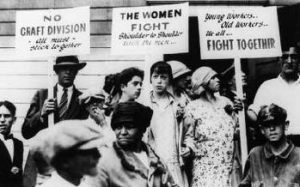
Textile workers on strike in 1928, New Bedford, Massachusets, USA
LOS ANGELES (USA) — The mother of two young women comrades works at a butcher shop in south Los Angeles. She is the only woman butcher on that job—a traditionally male job. When she was hired, her male co-workers demonstrated the opposite of solidarity. When she got hurt on the job, the negative comments increased.
Nevertheless, she persisted. An immigrant and single mom, she goes to work every day. She has to, whether her male co-workers like it or not, like every other wage slave. She needs a pay check to survive. Only communism can free all workers from this wage slavery. Mobilizing for communism demands working-class unity across the boss-created divisions of race, gender and nationality.
Women have always worked.
In the 19th century, industrial capitalism began to replace the food, clothing and other goods that women had traditionally produced in the home with factory-produced commodities. This established the material basis for women’s employment as wage-slaves in the factories.
Many women – especially black, indigenous and immigrant women – have always worked outside their homes. Enslaved African women in the US hoed weeds and picked cotton alongside men. Black and immigrant women have worked as domestic servants. Female Irish immigrants in the US were among the first to be employed in the textile mills.
Women first became industrial workers in English textile mills industry at the beginning of the 19th century. This is an ongoing process which continues worldwide. And as women became industrial workers they began to organize class struggle. They helped lead textile strikes in England in the 1820s and in the US starting in 1835.
Capitalist competition pits men and women workers against each other.
Capitalists took advantage of women’s vulnerability and the division of the working class to lower wages. They extensively used child labor to lower wages and increase exploitation in the textile mills, farms and even coal mines. In some places, this continues today.
Trade unions responded with a sexist and reformist strategy of “protecting men’s jobs.” In 1877 the Secretary of the Trade Union Congress in England was cheered as he demanded a “family wage” where men could earn enough money to support their families and keep their wives at home.
In contrast, Social Democrat Clara Zetkin called on men and women workers to fight for equal pay for equal work. Instead of blaming women, she blamed the capitalists for the super-exploitation of women’s labor and called for the unity of the working class. In contrast to bourgeois feminists, she called on proletarian women to join with men to fight for better working conditions for all workers.
Communists Call for Class Unity to End Wage Slavery
Marx and Engels saw the extensive employment of female labor as inevitable and irreversible. The Communist Manifesto (1848) challenged the gendered division of labor, saying that women’s emancipation depends on the abolition of private property and the creation of a communal domestic economy.
Engels, in Origin of the Family, Private Property and the State (1884), saw capitalism as creating the preconditions for women’s liberation by involving women in social production. But only communism could create a new family form that properly corresponded to women’s new roles.
Both Marx and Engels had a somewhat mechanical view that the experience of industrial work was a necessary condition for women’s liberation. But women comrades from rural communities in El Salvador who participated in armed anti-imperialist struggle and women comrades in South Africa who fought against apartheid have become communist leaders.
However, women industrial workers – like those in the maquilas in El Salvador, in the sweatshops in Bangladesh, and in Boeing factories and MTA in the US – are strategically positioned to give leadership to our class. Instead of the sexist and reformist demand for a “family wage,” we fight to end the wage system and mobilize the masses for communism.
Women like the butcher in Los Angeles need the support of male comrades, who must lead others in the fight against sexism. Male workers who see their jobs as “manly” are hurting themselves and their class by putting gender identity ahead of class consciousness.
We must see each other as co-workers and potential comrades. The experiences of women workers, especially women workers of color will help provide the leadership the working class needs in its march toward communism.
JOIN THE INTERNATIONAL COMMUNIST WORKERS’ PARTY

Women guerrilla fighters, El Salvador
Protecting our “jobs” vs. fighting to end the wage system
The English trade unions fought to keep women out of “men’s jobs” in 1877 they were pursuing a strategy that unions have pursued for generations. The fight to protect “our jobs” illustrates the dead-end nature of reformism and trade unionism. Fighting to defend a job makes it inevitable that workers will fall into the traps of racism, sexism and xenophobia that the bosses set for the working class.
The history of the trade union movement in the United States and South Africa is full of examples of white workers fighting to keep black workers out of skilled jobs.
US unions kept Chinese and Japanese immigrants out of unions for almost a hundred years.
The United Farm Workers Union under Cesar Chavez and Dolores Huerta attacked undocumented immigrants as they came across the border and called the Immigration cops on them in the San Joaquin Valley.
Unions in the US with their “Look for the Union Label” and “Buy American” campaigns promote a nationalist and xenophobic agenda as they defend the wage slavery of US workers.
Even in the short run, this is a losing strategy. Wherever unions have kept women, people of color and immigrants out the unions, the bosses have been able to use them as strike-breakers.
But the solution is not a more inclusive trade unionism that can win a few nickels and dimes from the bosses in a contract struggle. We don’t put slogans like “Organize Undocumented Workers” on our protest signs.
We fight for the international working-class unity of immigrants and citizens that we need to wipe out capitalist exploitation once and for all. Our slogan is “Fight for a Communist World without Racism, Sexism, Borders, and Wage Slavery!”

Women worker, India

